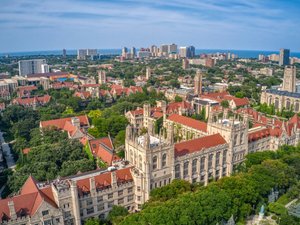
This story is part of our Inno on the Road series, where we take a look at innovation hubs throughout the Midwest. Check back all week for more coverage on Ann Arbor, Mich.'s tech and startup scene.
When people think of innovation hubs, Ann Arbor, Mich., probably isn’t the first place that pops into their minds. They’ll first think of Silicon Valley, Boston, or maybe even Chicago.
Ann Arbor is known for being a college town, and it is. Much of its economy, culture and residents are closely linked to the University of Michigan. But another community there—its tech and startup scene—is growing.
Over the last two decades, Ann Arbor has morphed into a bustling tech hub.
Being right next to Detroit, also known as the "motor city," Ann Arbor has established itself as the home to autonomous vehicle innovation with Mcity, a University of Michigan-affiliated testing center.
It's also become a destination for major tech companies. Google, which first put an office in Ann Arbor back in 2006, recently upgraded that space. Moving into a new 135,000-square-foot office, Google now employs more than 450 people in Ann Arbor, and more than 600 in Michigan. And Expedia, the online platform that provides travel deals, also has an office in Ann Arbor.
But besides these global tech giants establishing a presence there, the area also has a growing number of startups and tech companies that were born there. Previously, many tech companies launched in Ann Arbor would eventually be moved to one of the coasts, as their founders looked at Boston or San Francisco as better opportunities to blossom. But that trend has changed.
More and more entrepreneurs are starting businesses in Ann Arbor and keeping them there. By all accounts, they have the resources they need. With plenty of fresh talent from UMich, active investors, and co-working and incubating spaces, tech companies have proven that they won't just survive in Ann Arbor, but thrive.
“Ann Arbor now has a critical mass of successful startups and serial entrepreneurs,” said Jim Price, a lecturer in entrepreneurial studies at the University of Michigan’s Ross School of Business and an entrepreneur in residence at the business school’s Zell Lurie Institute. “Thirty years ago, most people would leave, but it’s getting to the point now, where an awful lot of people are staying.”
And Price happens to be one of those entrepreneurs who has made Ann Arbor home. Though he now spends much of his time teaching at UMich, he spent the bulk of his career as a serial entrepreneur in the area.
He was the co-founder of Cielo MedSolutions, a healthcare software-as-a-service (SaaS) startup in Ann Arbor that delivered cloud-based software to help primary care physicians manage their patients. After launching in 2006, Cielo MedSolutions was sold to The Advisory Board Company for $15 million in 2011. Before that, he was the CEO and co-founder of Transom Technologies, a human modeling and simulation software startup. After raising $4.8 million in funding, the company was sold to EAII, now known as Seimens, for $20 million in 1998.
Generally, Ann Arbor tech companies tend to operate in the business-to-business space, and one of the city's most notable B2B companies, Duo Security, just crossed the $1 billion valuation mark this fall, earning unicorn status. The company, which makes cybersecurity software, employs 500 people worldwide and 350 in Ann Arbor.
“There are a number of Ann Arbor-born and bred startups, like Duo, that are venture-capital backed, very successful and are employing in the hundreds of people,” Price said. “There are quite a few like that in a variety of different tech sectors.”
"There are hundreds of people here that are paying it forward when they see success."
Price said Duo’s success and recent unicorn status is an asset that other entrepreneurs in Ann Arbor can use can to draw attention, investors and even other entrepreneurs to the city.
“It strengthens the organic ecosystem,” Price said. “It has raised the water level here dramatically, and rising waters lift all boats.”
One startup's success often becomes another's success, Price said. Not only is the reputation of Ann Arbor as a tech hub strengthened, but when a company crosses the $1 billion valuation mark, certain employees with the company will then have stock options and resources that they didn’t before. Those employees interested in building their own company will have the freedom to quit their day job and go without a paycheck while they build the area’s next startup. It’s a cycle Price said he’s seen time and time again, and a scenario that he experienced while building his companies.
“They can afford to start something on their own,” Price said. “They have the useful scar tissue that they can apply now to pay it forward. There are hundreds of people here that are paying it forward when they see success.”
Other major tech pillars in the city besides Duo Security include LLamasoft, a supply chain software provider, and ForeSee, a web analytics platform, companies that have established themselves as multi-million dollar companies. They started with a good idea and a strategic leadership team, but also have had support from local investors.
"Ann Arbor now has a critical mass of successful startups and serial entrepreneurs."
Price said that though many of the big investments still come from the coasts, the local investors often supply much of the early-stage investing. Ann Arbor Angels, Resonant Venture Partners and Mercury Funds are a few, and are all headquartered in Ann Arbor. Additionally, the Zell Lurie Institute, where Price teaches, has five student-run VC funds.
“We’ve got lots of capital here, where we didn’t before,” Price said.
Other crucial and supportive aspects of Ann Arbor's tech ecosystem include the significant number of co-working spaces and incubators there, including the TechArb, a student accelerator at UMich, and the Desai Accelerator, another UMich program similar to TechStars.
Though Ann Arbor's innovation resources have beefed up in recent years, Price said some challenges persist. Whether it's being ignored by coastal investors, or struggling to get other tech ecosystems to take them seriously, Ann Arbor still has some maturing to do before it begins competing with the larger ones. But as the city has continued to grow as a tech hub, entrepreneurs are sticking around. And people who've left Ann Arbor to launch tech companies elsewhere are starting to return, Price said.
“What has made up a really vibrant tech startup community in the last two decades?” Price asks. “You’ve got great people and talent—a lot of them coming out of the university. But interestingly enough, you have a lot of people either who grew up here, and come back, or went to UMich and then circle back after they’ve been on one of the coasts or Chicago. Maybe they just like the Ann Arbor lifestyle.”








